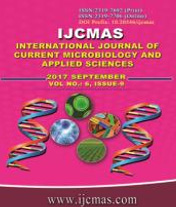


 National Academy of Agricultural Sciences (NAAS)
National Academy of Agricultural Sciences (NAAS)

|
PRINT ISSN : 2319-7692
Online ISSN : 2319-7706 Issues : 12 per year Publisher : Excellent Publishers Email : editorijcmas@gmail.com / submit@ijcmas.com Editor-in-chief: Dr.M.Prakash Index Copernicus ICV 2018: 95.39 NAAS RATING 2020: 5.38 |
Anaemia is a pathological condition in which the oxygen carrying capacity of red blood cells is insufficient to meet body’s needs, which leads to problems to mother and poor fetal and placental outcome. The aim of the study was to compare the fetal and placental outcome among Anaemic and non- anaemic mothers of selected hospital of district Mohali, Punjab.A quantitative research approach with comparative design was adopted. Total 100 mothers out of which 50 anaemic and 50 non-anaemic were taken by using non probability, purposive sampling technique to identify the fetus and placental outcome difference in anaemic and non-anaemic mothers. Tool was made up of protocol to assess fetal outcome and protocol to assess placental outcome. Collected data was analyzed by descriptive and inferential statistics. The analyzed data out of 100 mothers majority of the anaemic mothers 74% were in the age group of 21-30 years and in non-anaemic 86% were in age group of 21-30 years, 66% anaemic mothers were from joint family and 52% nuclear family and in non-anaemic 71% were from nuclear family, most of the anaemic mothers 48% of mothers had 5001-10000 family income and in non-anaemic mothers 66% had 5001-10000, maximum 44% anaemic mothers had Sikh religion and in non-anaemic 58% also from Sikh religion, 46% of anaemic mothers had primary and 32% of non-anaemic mothers had secondary education, 78% of anaemic mothers and 66% of non-anaemic mothers were home maker, 54% of anaemic mothers were vegetarian and 66% of non-anaemic mothers were non-vegetarian, 58% of anaemic mothers were from rural and 60% of non-anaemic mothers were from urban area. Fetal outcome the 28.0% anaemic and 72.0% non-anaemic mothers had good fetal outcome and 68.0% anaemic and 32.0% non-anaemic mothers had poor fetal outcome. Placental outcome the 18.0% anaemic and 82.0% non-anaemic mothers had good placental outcome and 46.0% anaemic and 54.0% non-anaemic mothers had poor placental outcome. χ2 value showed that there was statistically no significant association with demographic variables of anaemic and non-anaemic mothers.
 |
 |
 |
 |
 |